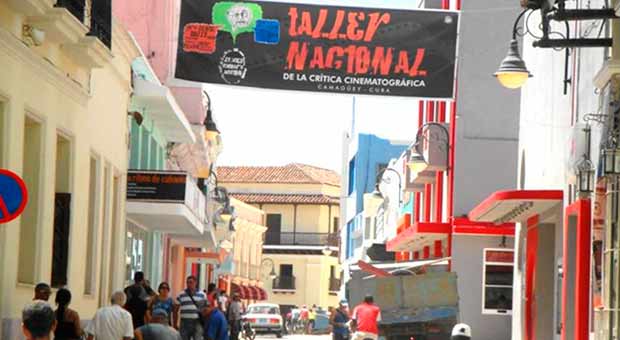Around these days Camaguey province has become the venue for the most important event held annually in Cuba in terms of films; that is, a Workshop on Cinematographic Criticism. From the Cuban Film Institute (ICAIC by its acronym in Spanish) in Havana; from Santiago de Cuba and in Camaguey, critics and producers in representation of different generations from in and out the country come together to evaluate Cuban productions. On this occasion, the participants will make a thorough assessment of the Cuban cinematographic production from the 80’s. In this sense, the organizers of the event have created a panel devoted to films produced by Fernando Perez, Juan Carlos Tabio and Rolando Diaz.
The workshop will be attended by Rolando Diaz, who took part in the comedy Los pájaros tirándole a la escopeta or the sports drama En tres y dos, films that have marked the Cuban filmography. The presence of Rolando Diaz in the event has aroused special interest for the people from Camaguey and for the participants in the panel as he will premiere his documentary Los caminos de Aissaand his full-length film Cercanía, stared by Reynaldo Miravalles.
A dialogue with Juan Antonio García Borrero, cinema critic and author of the blog La pupila insomne allows us to have a closer and more complete idea of the proposals and goals set for this 20th edition of the event.
During the early 90’s, he undertook the task, along with a solid team, to create an event that brings together and promotes intellectual thinking on Cuban audiovisuals. Since 1993 he has fought every obstacle that would hinder a new edition of the workshop and has made sure that every March critics reflect on their roles. In addition, Juan Antonio GarcíaBorrero has contributed with his blog with a space for debating on audiovisual production in Cuba during the 12 months between one edition and the other.
What does it feel to be able to share one more time with those that in 1993 joined your idea to create a workshop on cinematographic criticism?
I believe it is an interesting experience because really none of us that participated in the first event had any clue that it will go on for so long. I think we have all grown, we have changed, and we have enriched our vision on cinematographic criticism. That growth has somehow contributed with making us feel that after 22 years it was worthy. Actually we would have loved to count on the attendance of other founders like Antonio Mazón and Carlos Galiano. However, the important thing is that many of their ideas are present at the event even though they are not here with us.
In your opinion, what are the challenges that this workshop is facing in its 20th edition?
This event still needs to grow more. In my opinion, 20 years is fine for closing a certain stage, but it is obvious that critics today are facing new challenges. Traditional criticism has come to a point where it must take into account the new emerging audiences, the fact that the new technologies are conditioning new forms of representing reality, but at the same time of perceiving and receiving that reality. In this sense, critics have to be reborn rather than insist on a particular way to look at the cinema. In that line I believe the workshop has all the necessary grounds for continuing to exist.
Why has the workshop in this edition decided to take as starting point the cinematographic production and the criticism from the 80’s in particular?
During the past few years, the workshop has carried out some sort of chronological scan. We had an edition dedicated to the 60’s. On that occasion we made a very critical rereading of the so-called prodigious decade. A couple years ago, we discussed about the Cuban cinema during the 70’s, and obviously we thought that this could be an opportunity to go back to the 80’s, a period that has been misinterpreted due to lots of prejudices. About three or four films have predominated and taking them as referents to evaluate something as complex as the Cuban cinema from that epoch, which, by the way, was not limited to ICAIC’s production but included other materials no registered with this institution. I consider the workshop will be a perfect chance to assess ICAIC’s productions and to establish links with what was going on at that time in and out of the country.










